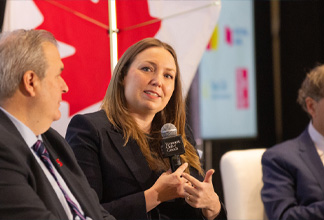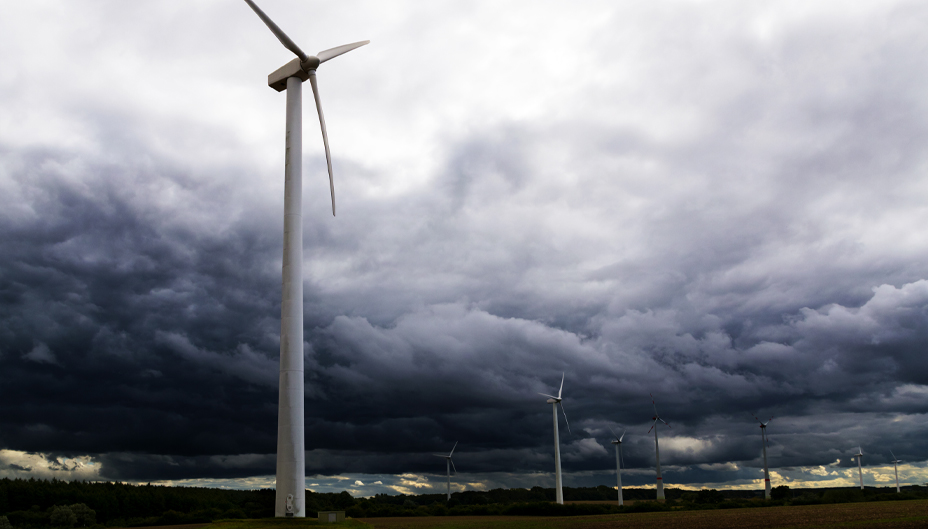The Climate and Your Investments: How They Connect
Written by The Inspired Investor Team
Published on October 5, 2021
minute read
Share:
A recent United Nations-led report by the Intergovernmental Panel on Climate Change warned that human influence is likely behind the deadly heat waves, severe winter storms and other alarming weather extremes rocking the globe, and that the frequency—and intensity—of droughts, heavy precipitation and tropical cyclones is on the rise.
Canadian investors are paying attention. A Pembina Institute study published in March 2021 revealed that Canadians want to align their investments with climate goals, and a full 79 per cent want society to respond to climate change with the same urgency as COVID-19. Similarly, in December 2020, U.S. investment manager BlackRock shared results of a survey on sustainable investing. Among the findings: “investors representing US$25 trillion in assets plan to double ESG assets in five years" and “climate-related risks are the top sustainability portfolio concern for 88 per cent of respondents."
“There is really no historical precedent for the magnitude of the shift in investor focus that we've witnessed over the last decade toward the analysis and use of climate and other ESG risks and impacts in investment decision-making," said Allison Herren Lee, then acting chair of the U.S. Securities and Exchange Commission, in a speech earlier this year. “The last year has helped to clarify why the perceived barrier between social value and market value is breaking down," she said, and more and more investors are considering ESG – environmental, social and governance – factors in their decision-making. Moreover, concerns about climate and supply chain disruptions are increasingly echoed in boardrooms, she added.
That's for good reason. In 2020, a meta-analysis by NYU Stern Center for Sustainable Business looked at more than 1,000 business studies published over the previous five years, and found that 58 per cent of them positively linked a company's ESG activities and improved operational metrics such as ROE (return on equity), ROA (return on assets) or stock price. Companies were more sustainable and better protected against social and economic crises. Similarly, 59 per cent of the investment studies reviewed in the analysis found that ESG-led investment strategies produced similar or better results compared to conventional investment strategies.
As an independent investor faced with the complex issue of climate change, you might wonder what steps you can take. But climate change action doesn't just happen at the government or corporate level. Individuals can make thoughtful investing decisions, too, taking steps to help both portfolios and the planet. If you feel inspired to take an ESG lens to your portfolio, as many investors have, here are some key points to consider from experts in sustainability, finance and business.
Take a long-term view of traditionally non-sustainable industries and sectors
Oil and gas investments have been prominent in many Canadian portfolios over many years. While some businesses have urged shareholders to vote against proposals calling for emissions reductions, others have outlined long-term plans to reach net carbon zero. Some major oil and gas producers have taken the step of acknowledging their roles in producing carbon for decades to come, and have transitioned business plans to include funding for carbon-capture technologies, biofuel research and other projects aimed at reducing their carbon footprint — moves aimed at meeting some shareholder's expectations.
Given the shifts taking place within the industry, an investor thinking about getting in or out of that sector should, of course, consider the timing. “It is important to understand that there will be a transition towards net zero," says Sara M. Alvarado, executive director of the Institute for Sustainable Finance, whose mandate is to align mainstream finance with sustainable finance through research, education, collaboration and outreach. It will not happen overnight, she adds, so it is important to track the specific long-term plans of companies that have plans to decarbonize or incorporate ESG metrics. By her estimation, companies that succeed in executing their plans will likely fare better than those that don't.
Asking yourself 'What's my time horizon?' is essential as well, says Derek Eaton, director of public policy and outreach at Smart Prosperity Institute, a national research network and policy think tank based at the University of Ottawa. As a shifting policy landscape increases uncertainty around oil and gas investments, assessing the risk-return relationship is more difficult, he says. Investors can benefit from adjusting their perspective and looking critically at how analysts incorporate risk in their judgments.
Consider the broader risks to your whole portfolio
How might insurance costs, flooding, drought, storms or fires affect your overall holdings? To help determine this, investors have an increasing amount of research at their disposal.
“There's no question that the strange weather events in North America over the last five years or so have an effect on folks thinking, 'This is real and we need to make some changes,'" says Tessa Hebb, a distinguished research fellow with the Carleton Centre for Community Innovation at Carleton University and a former board member of the Responsible Investment Association, whose work focusses on responsible investment and impact investing. She suggests diving into recent research by Blair Feltmate, an associate professor in the environment faculty at the University of Waterloo and chair of the Climate Change Adaptation Project.
On this point, Alvarado points to the Office of the Superintendent of Financial Institution's overview of climate-related risks, which are physical risk, transition risk and liability risk. Examples of physical risks include water damage, storms and the like. Transition risk refers to the challenges of adjusting business models in response to net-zero goals, such as implementing carbon capture or switching up supply chains. Liability risk stems from the fiduciary duty of boards to disclose material risks the organization is subject to, and that includes climate change. “From the perspective of the individual investor, there will be more and more disclosure coming out for them to be able to do the analysis, and such disclosure is expected to get more standardized to allow for proper comparison," says Alvarado.
Assess sustainable investing opportunities
With significant shifts in society come opportunities. What might that mean for independent investors? “You might think about, 'Well, it's good to have some exposure to relatively proven [sustainable] companies and technologies,' but on the riskier side of your portfolio, wouldn't it be great if you get a piece of the next Tesla?" says Eaton. The way he sees it, many companies in clean energy and related technologies will succeed – but it's just as likely that an even greater number will fail or underperform. “You might think about how you're spreading your risk around your portfolio."
Identifying truly worthwhile investments can be a challenge. “The more individual investors educate themselves, the better informed they are to be able to distinguish between the ones that have real strategies and execution plans, and the ones that are greenwashing," says Alvarado, referring to the practice of misleading consumers into believing a brand is more environmentally conscious than it actually is. Does the company have a strategy and execution plans? Is it looking at standardizing the reporting? What is the level of the reporting? The answers to these questions can help investors make more informed decisions, she says.
How do you research climate and investments?
A lack of standardization, consistency and mandatory disclosure are some of the obstacles facing investors seeking more information. And when an organization does voluntarily release information, Eaton suggests a dose of healthy skepticism. “Unfortunately, because this is not yet a very regulated area—it's been largely market driven—there are clearly risks of greenwashing," he cautions.
Alvarado agrees. “There are some ESG rating entities, but, mind you, they are not very consistent in the methodology," she says. Reading a large company's sustainability report, which may be part of the annual report or its own standalone document, can give investors some insights into both the company's footprint and its future plans, she says. “Look at how sustainability strategy is incorporated in performance metrics as an indication of execution focus."
Alvarado adds that she and her working-group colleagues at the CFA Institute (a global, not-for-profit professional organization focused on finance and investments education) are working on a resource, centred on a consultation paper in progress that looks at the development of voluntary, global ESG disclosure standards for investment products, which may ultimately be a useful resource for investors.
If you're investing in mutual funds or ETFs, Hebb suggests looking at indexes that track companies that rate highly on ESG factors, or environment/climate-related data in particular, as one starting point. The average investor can also access research and publications via the RIA in Canada. She adds, “We're seeing increasing numbers of mutual funds and exchange traded funds that are seeking net zero [carbon emissions], going to 2050. So that's another thing to look for. That's a good signpost."
Investing with your heart and mind
If you decide to consider climate in your investments, Hebb says that it's a worthwhile endeavour. “It's not just enough for the government, or the municipalities, or the mutual funds, et cetera, to make changes. It really behooves each and every one of us to take whatever actions we can to move towards a low-carbon economy. And I consider the investment portfolios of Canadians to be a tremendous asset that can help in that transition."
Eaton agrees that the payoff goes beyond finances. “I would hope for many investors [to experience] a positive personal satisfaction, being part of a process of supporting change through capital markets, on what is really an existential issue. … If you're able to contribute to the overall process, that's investing with your heart, as well as your mind."
RBC Direct Investing Inc. and Royal Bank of Canada are separate corporate entities which are affiliated. RBC Direct Investing Inc. is a wholly owned subsidiary of Royal Bank of Canada and is a Member of the Investment Industry Regulatory Organization of Canada and the Canadian Investor Protection Fund. Royal Bank of Canada and certain of its issuers are related to RBC Direct Investing Inc. RBC Direct Investing Inc. does not provide investment advice or recommendations regarding the purchase or sale of any securities. Investors are responsible for their own investment decisions. RBC Direct Investing is a business name used by RBC Direct Investing Inc. ® / ™ Trademark(s) of Royal Bank of Canada. RBC and Royal Bank are registered trademarks of Royal Bank of Canada. Used under licence.
© Royal Bank of Canada 2021.
Any information, opinions or views provided in this document, including hyperlinks to the RBC Direct Investing Inc. website or the websites of its affiliates or third parties, are for your general information only, and are not intended to provide legal, investment, financial, accounting, tax or other professional advice. While information presented is believed to be factual and current, its accuracy is not guaranteed and it should not be regarded as a complete analysis of the subjects discussed. All expressions of opinion reflect the judgment of the author(s) as of the date of publication and are subject to change. No endorsement of any third parties or their advice, opinions, information, products or services is expressly given or implied by RBC Direct Investing Inc. or its affiliates. You should consult with your advisor before taking any action based upon the information contained in this document.
Furthermore, the products, services and securities referred to in this publication are only available in Canada and other jurisdictions where they may be legally offered for sale. If you are not currently resident of Canada, you should not access the information available on the RBC Direct Investing Inc. website.
Explore More

7 Ways to Get Ahead Financially in 2026
How you might invigorate your finances and put your money to work more intentionally this year
minute read

Economic Outlook: Uncertainty is Here to Stay, So What's Next?
Takeaways from the Economic Club of Canada’s Annual Event
minute read

3 things: Week of December 15
What the Inspired Investor team is watching this week
minute read
Inspired Investor brings you personal stories, timely information and expert insights to empower your investment decisions. Visit About Us to find out more.







